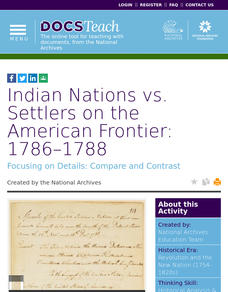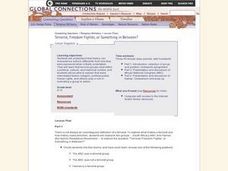Curated OER
Sacco and Vanzetti: “The Case That Will Not Die”
Studying this case within its historical context can help us better understand urgent current issues of today.
Roy Rosenzweig Center for History and New Media
Rosa Parks and the Montgomery Bus Boycott
Participants examine two documents related to Rosa Parks and the bus boycott, sources that challenge some of the commonly held preconceptions about Rosa Parks. They then respond to discussion questions to reinforce understanding and...
DocsTeach
Indian Nations vs. Settlers on the American Frontier: 1786–1788
Once Americans won the Revolutionary War, their quest to gain land did not end. An interesting activity focuses on Americans' expansion into the frontier following the war and how it conflicted with Native Americans living in the area....
DocsTeach
The School Lunch Program and the Federal Government
The school lunch program is rooted in the struggles of the Great Depression and is still assisting families today. Academics research documents and images relating to the creation of the school lunch program. Scholars use a worksheet to...
DocsTeach
Lewis and Clark's Expedition to the Complex West
Lewis and Clark's famous expedition is a prime example of the United States' westward expansion. Aspiring historians examine maps from Lewis and Clark's journey, as well as discuss their interactions with Native American tribes. The...
DocsTeach
U.S. v. Amistad: A Case of Jurisdiction
Just what is jurisdiction and why does it matter? A helpful activity takes academics on a journey to understand how judicial jurisdiction works. Scholars read excerpts from the Constitution and court documents to understand the process...
DocsTeach
Political Cartoon Analysis: No Taxation Without Representation
Delve into the world of political cartoons in a lesson on the American Revolution. Scholars practice analyzing an original political cartoon, answer questions, and participate in group discussion. Young academics gain an understanding of...
DocsTeach
To Sign or Not to Sign
To sign or not to sign, that is the question. Scholars review the Declaration of Independence and discuss the Framers' decisions for signing the document. The activity uses primary text, a worksheet, and group discussion to help...
DocsTeach
Analyzing a Letter from Jackie Robinson: "Fair Play and Justice"
Jackie Robinson was more than a baseball legend; he was an activist, too. An interesting resource explores Robinson's time in the military using primary sources. Scholars examine the racially inspired event that led to a court martial...
DocsTeach
Analyzing Einstein's Citizenship Application
Albert Einstein contributed greatly to America's history, but he wasn't always a citizen. An engaging activity analyzes Einstein's citizenship application to understand the process of immigration and how it impacts those trying to reach...
DocsTeach
Analyzing a Writing Assignment by a Teenage Refugee in New York During World War II
Young historians delve into the world of teenage refugees during WWII to understand their experiences. The activity focuses on a writing assignment from a teen staying at a US refugee camp to explore the struggles they faced, such as...
DocsTeach
Confronting Work Place Discrimination on the World War II Home Front
Before the Civil Rights Movement was in full swing, FDR's executive order helped promote fair employment. The activity uses primary documents to explore FDR's executive order to help minorities gain equal employment and pay during the...
DocsTeach
Two Versions of FDR's Infamy Speech
Historians follow FDR's Infamy speech from rough draft to the official address to the Senate. An intriguing activity compares and contrasts FDR's original speech to the official version. Academics also listen to FDR address the Senate....
US House of Representatives
House History Comes Alive
How reliable is oral history? The resource uses the oral history website to help academics understand the pros and cons of using recollections to teach others. Scholars complete a worksheet, draft a letter to a representative, and...
Stanford University
Arabian Peninsula
How do cultural differences affect our view of history? The assessment geared towards high school historians, focuses on the credibility of primary sources. Young academics analyze a text and complete short answer questions to determine...
Curated OER
Words/Music/Images: Interpretation and Meaning A Motivational Activity
Learners explore popular music in its historical context. In this music lesson plan, students examine the lyrics, musicical arrangement, and video imagery of selected songs to interpret the messages and themes of the songs.
Curated OER
Art of Cynicism
High schoolers analyze selected pieces of art and infer how they reflect a sense of disillusionment, and/or cynicism in American society in the aftermath of the Vietnam War and Watergate scandal. Then they identify and place cultural...
Curated OER
Terrorist, Freedom Fighter, or Something in Between?
Students identify that history can characterize actions differently from how they were perceived when initially undertaken. Then they identify that terrorist groups exist within a political, cultural, and historical context, and students...
Curated OER
Live From Antiquity!
High schoolers gain an appreciation for Greek drama through study of a play by Sophocles. They explore the cultural and historical context of Greek drama and its role in Greek society. Students write a report after seeing the play...
Curated OER
1846: Portrait of America in the Time of Don Pasquale: An Historic Look at American Life During the 1840's
Students construct an historical timeline extending from 1840-1850. They discuss various people, places, and events on their timelines.
Curated OER
Critical Reading, Imaginative Writing and the Montage
Young scholars discuss the difference between primary and secondary sources and consider how an exhibit is researched. They design and create a montage that reflects themselves in a social and historical context.
Curated OER
American History Through the Len of the Supreme Court Decisions
Students examine the historical background of Supreme Court decisions and the basic principles behind legislation. As part of the lesson, students discover legal concepts and terms and write sentences using the vocabulary they have...
Museum of the Moving Image
AdMaker, Nixon vs. Humphrey, “Convention” (1968)
After viewing the infamous 1968 Presidential campaign ad, "Convention," groups use AdMaker to create their own 30 second ad that features Richard Nixon rather than Hubert Humphrey.
Curated OER
Jazz In America
Students gain a fundamental understanding of the role of jazz in the Harlem Renaissance. They explain its historical significance and cultural implications.

























